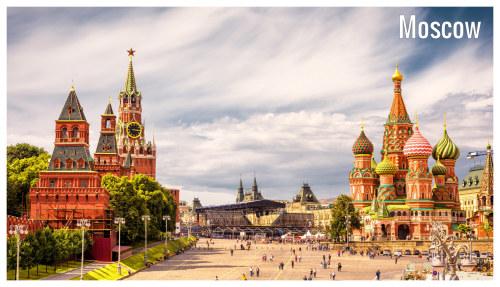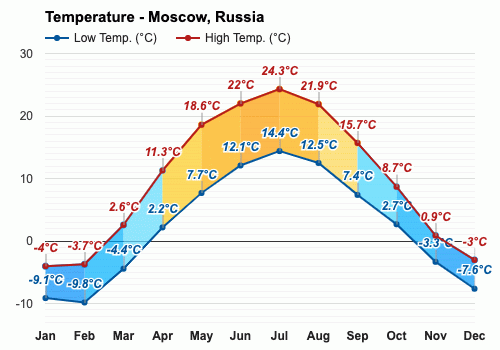Contents
- The climate of Moscow
- The best time to visit Moscow
- The worst time to visit Moscow
- Spring weather in Moscow
- Summer weather in Moscow
- Autumn weather in Moscow
- Winter weather in Moscow
- Weather in January
- Weather in February
- Weather in March
- Weather in April
- Weather in May
- Weather in June
- Weather in July
- Weather in August
- Weather in September
- Weather in October
- Weather in November
- Weather in December
- Frequently asked questions
- Average temperature
- Average humidity
- Average rainfall
- Average rainfall days
- Average snowfall days
- Average daylight
- Average sunshine
- Average UV index

The climate of Moscow
In an annual observation of weather trends, descending temperatures are common between the months from November to March with average lows ranging from -9.1°C (15.6°F) to -7.6°C (18.3°F) and highs from -4°C (24.8°F) to 2.6°C (36.7°F). Contrastingly, a rise in temperature is observed from April to September ranging from 11.3°C (52.3°F) to 24.3°C (75.7°F) in average high temperatures and 2.2°C (36°F) to 14.4°C (57.9°F) in average lows.
In terms of precipitation, the trend showcases an increase in rainfall from May to October with monthly averages fluctuating from 49mm (1.93") to 85mm (3.35"). The city also experiences some snowfall, most commonly from November to March, with an average of 10 to 18 snowfall days per month. Humidity remains relatively high throughout the year, hovering around 64% to 85%. Details show longer daylight hours in summer with peak sunshine hours in June of 9.3 hours a day, while winter months see less sunlight, with December clocking in the shortest duration of an average of 0.6 sunshine hours daily.
The best time to visit Moscow
The worst time to visit Moscow
Spring weather in Moscow
Summer weather in Moscow
Autumn weather in Moscow
Winter weather in Moscow
Weather in January
Weather in February
Weather in March
Weather in April
Weather in May
Weather in June
Weather in July
Weather in August
Weather in September
Weather in October
Weather in November
Weather in December
Frequently asked questions
What is the coldest time of year in Moscow?
How many days does it rain in Moscow?
When does it snow in Moscow?
When does it snow the most in Moscow?
How many days does it snow in Moscow?
When is the lowest UV index in Moscow?
What is the driest month in Moscow?
What is the least humid month in Moscow?
When it does not snow in Moscow?
When are the longest days in Moscow?
What month has the most sunshine in Moscow?
What is the month with the highest UV index in Moscow?
What are the warmest months in Moscow?
What is the wettest month in Moscow?
What is the most humid month in Moscow?
What is the month with the shortest days in Moscow?
Is there Daylight Saving Time (DST) in Moscow?
What is the month with the least sunshine in Moscow?
Average temperature
Moscow, Russia

The warmest month (with the highest average high temperature) is July (24.3°C).
The month with the lowest average high temperature is January (-4°C).
The month with the highest average low temperature is July (14.4°C).
The coldest month (with the lowest average low temperature) is February (-9.8°C).
Average humidity
Moscow, Russia

The month with the highest relative humidity is December (85%).
The month with the lowest relative humidity is May (64%).
Average rainfall
Moscow, Russia

The wettest month (with the highest rainfall) is July (85mm).
The driest month (with the least rainfall) is March (35mm).
Average rainfall days
Moscow, Russia

- Average rainfall days in January:
0.8 days - Average rainfall days in February:
0.7 days - Average rainfall days in March:
3 days - Average rainfall days in April:
9 days - Average rainfall days in May:
13 days - Average rainfall days in June:
14 days
- Average rainfall days in July:
15 days - Average rainfall days in August:
15 days - Average rainfall days in September:
15 days - Average rainfall days in October:
12 days - Average rainfall days in November:
6 days - Average rainfall days in December:
2 days
The months with the highest number of rainy days are July, August and September (15 days).
The month with the least rainy days is February (0.7 days).
Average snowfall days
Moscow, Russia

- Average snowfall days in January:
18 days - Average snowfall days in February:
15 days - Average snowfall days in March:
9 days - Average snowfall days in April:
1 days - Average snowfall days in May:
0.1 days - Average snowfall days in June:
0 days
- Average snowfall days in July:
0 days - Average snowfall days in August:
0 days - Average snowfall days in September:
0.1 days - Average snowfall days in October:
2 days - Average snowfall days in November:
10 days - Average snowfall days in December:
17 days
The month with the highest number of snowfall days is January (18 days).
The months with the least snowfall days are June, July and August (0 days).
Average daylight / Average sunshine
Moscow, Russia

- Average daylight in January:
7h and 5min - Average daylight in February:
9h and 4min - Average daylight in March:
11h and 5min - Average daylight in April:
14h and 1min - Average daylight in May:
16h and 2min - Average daylight in June:
17h and 3min
- Average daylight in July:
16h and 5min - Average daylight in August:
15h and 0min - Average daylight in September:
12h and 4min - Average daylight in October:
10h and 2min - Average daylight in November:
8h and 2min - Average daylight in December:
7h and 1min
The month with the longest days is June (Average daylight: 17h and 30min).
The month with the shortest days is December (Average daylight: 7h and 6min).
- Average sunshine in January:
1h and 1min - Average sunshine in February:
2h and 4min - Average sunshine in March:
4h and 1min - Average sunshine in April:
5h and 4min - Average sunshine in May:
8h and 3min - Average sunshine in June:
9h and 2min
- Average sunshine in July:
8h and 4min - Average sunshine in August:
7h and 4min - Average sunshine in September:
4h and 5min - Average sunshine in October:
2h and 3min - Average sunshine in November:
1h and 1min - Average sunshine in December:
0h and 4min
The month with the most sunshine is June (Average sunshine: 9h and 18min).
The month with the least sunshine is December (Average sunshine: 0h and 36min).
Average UV index
Moscow, Russia

The months with the highest UV index are June and July (UV index 6).
The months with the lowest UV index are January and December (UV index 0).
Moscow, Russia
Weather forecast for your location
2. Allow the app to use your location


